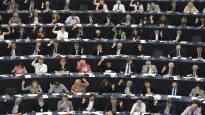The implementation of the EU climate package was complicated this week when Parliament decided to return key elements of the proposal to preparation. Russia’s hostilities underline the importance of the EU’s green transition.
10.6. 20:38 • Updated June 10. 21:32
BRUSSELS What a show! This is how the Finnish mayor described it The atmosphere in the Strasbourg Chamber after Wednesday’s heated climate vote.
Moments earlier, parliamentarians had decided to return the proposal to expand emissions trading to the preparation of Parliament’s Environment Committee.
At the same time, MEPs decided to suspend the Emissions Trading Social Climate Fund and carbon tariffs on products imported into the EU.
The collapse of key parts of the package in the vote was a clear surprise to the political groups in Parliament who blamed each other for what had happened.
According to the center-right EPP group, a good compromise was recruited unnecessarily. According to the Social Democrats, the Greens and the Left, it was right to reject the watered-down proposal from the point of view of climate goals.
There are buckets in the soap too Parliament’s right-wing, which is more prepared for the EU’s climate package. The EPP and a coalition of Socialists, Left and Greens accused each other with the far right of fraternity in voting.
More generally, the results of the vote show the relative weakness of Parliament’s middle political groups: in the small-margin vote, the unity of Parliament’s three major groups – the EPP, the Socialist Group and the Liberal Group – did not like it.
The decisive factor was the differing positions regarding the tightening of emissions trading and the free allocation of emission rights. Free allocation refers to free allowances offered to companies using cleaner technology.
In the right, the continuation of the free distribution receives more support than in the left and the Greens.
The business community is partly opposed to the end of the free distribution. Of particular concern is the competitive position of European companies in countries with lower climate standards outside the EU if the number of allowances is reduced and free allocation ends.
There are fears that, as a result, production may relocate outside the EU.
Parliament will therefore continue to seek reconciliation on the climate package. According to optimistic estimates, an agreement could be reached in June. A more realistic estimate is likely to return to the July part-session.
At the Strasbourg plenary session, a number of MEPs expressed concern that Parliament’s negotiating position vis-à-vis the Council representing the Member States would be weakened if decisions were prolonged.
Like Parliament, the Member States are currently formulating their views on the content of the climate package. The member states hope to move forward in their own position-making at the meeting of environment ministers at the end of June.
After that, the positions of the Council and Parliament still need to be reconciled in further negotiations.
The meeting of environment ministers can be seen as an account of how France has succeeded in promoting an important climate issue during its EU presidency.
More generally, the decisions of the next few weeks provide clues how seriously the EU is tackling the challenges of climate change. If decisions are postponed, the EU’s ambitious climate targets threaten to escape.
Russia’s relentless military action in Ukraine contributes to the importance of the EU’s climate decisions. Without alternative energy sources and energy-saving measures, it will be difficult to give up Russian energy.
Are EU climate action adequate? You can discuss the topic until Saturday, June 11 at 11 p.m.
